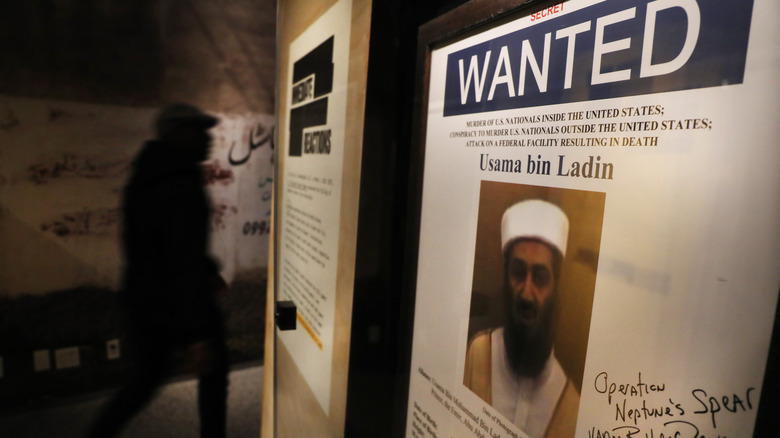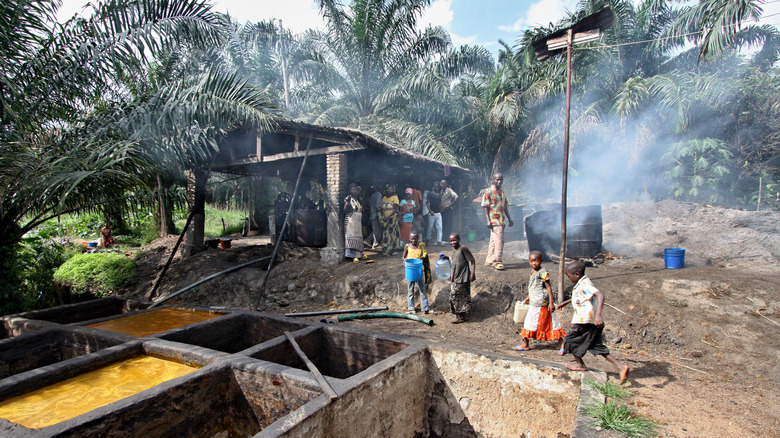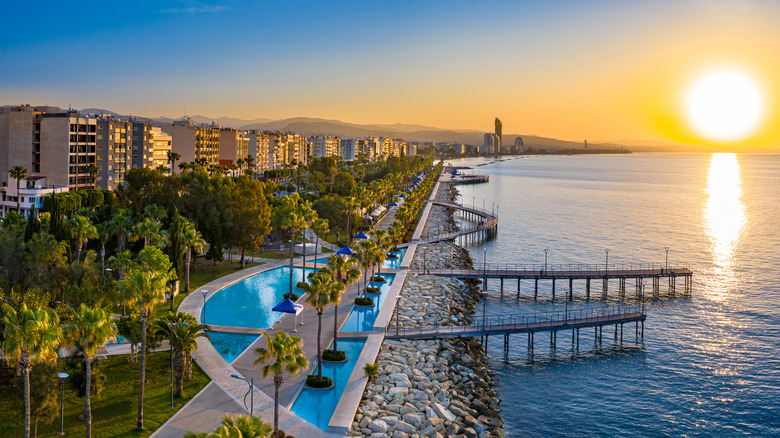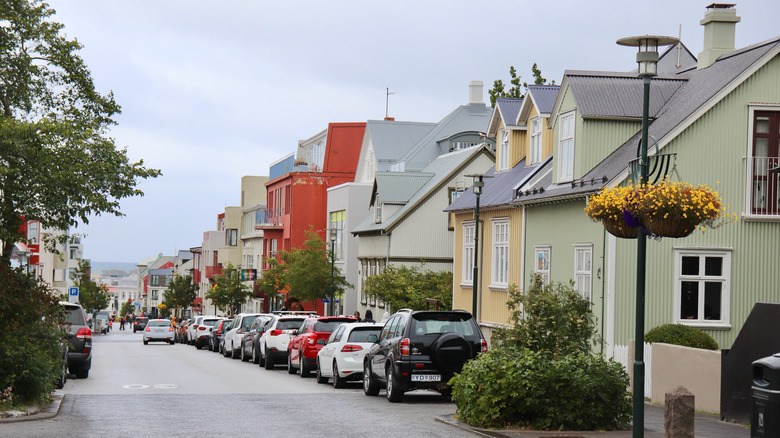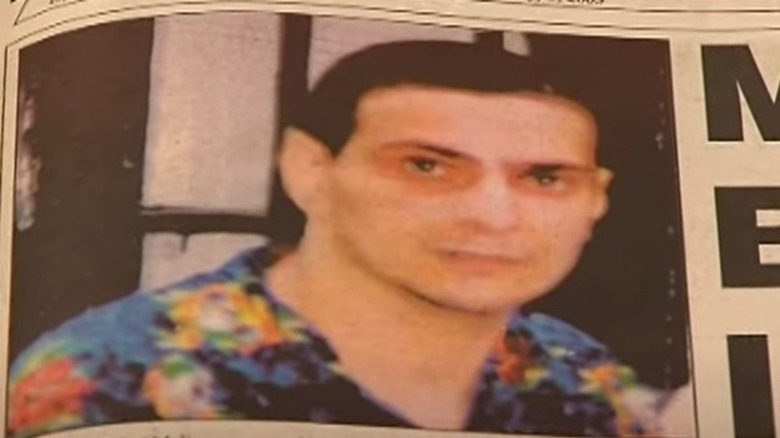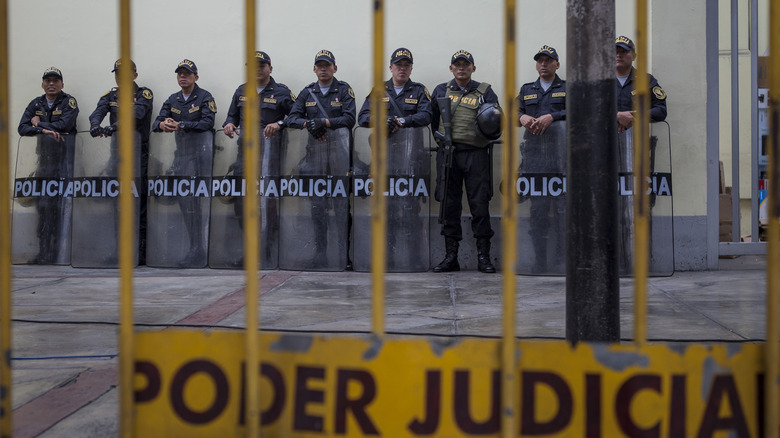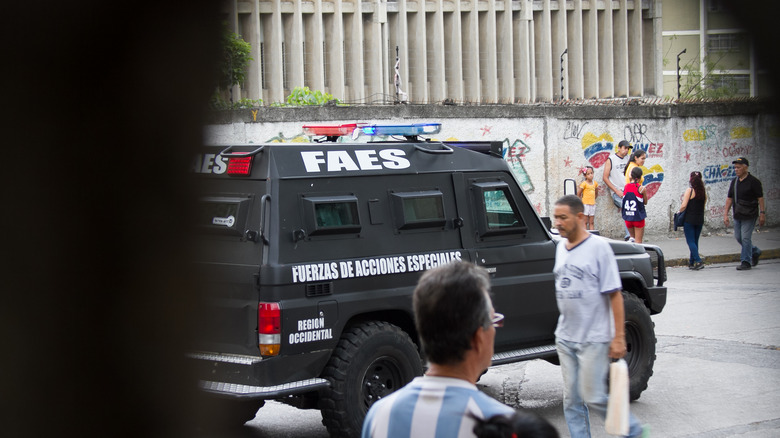Countries With The Smallest Number Of Serial Killers
Ted Bundy, Jack the Ripper, Jeffrey Dahmer. With an abundance of books, documentaries, and podcasts dedicated to true crime, serial killers are a part of mainstream culture these days, particularly American and British ones. There's a good chance you've heard of at least a few, even if you're not sure of all the details of their crimes. There's a decent chunk of research devoted to why certain places in the world produce a lot of serial killers (spoiler: the United States and United Kingdom top that list).
If you flip that around, though, you get a very, very different picture. There are several countries that can proudly say they have a very low number of reported serial killers, with a couple dozen claiming to have only one (or at least only one who is known and convicted). But the further you dig into the topic, things get pretty murky. There's no definitive list on exactly which countries have the least number of serial killers, and just as little information explaining how those countries managed that. There's just speculation and theories on the part of factors like homogenous populations and desensitization to violence that might lead to the lack of reported serial killers in these countries.
Afghanistan has a long history of violence
PBS explains that Afghanistan's history is fraught with violence. Internal groups wage war, and conquerors — Alexander the Great and Genghis Khan among them — have laid claim to the land. Even in the 20th century, things haven't been peaceful, between military coups, international tensions, and uncomfortably familiar terrorism. It seems like an ideal breeding ground for serial killers, right?
According to a paper by Fred Molitor and Kenneth William Hirsch, though, exposure to violence might actually do the opposite. People might just be used to the violence, completely desensitized. They may not really notice serial killers or else report them for a different crime entirely. So, yes, there possibly has been more than one serial killer, but they haven't necessarily all been recognized as such. That could explain things.
It also doesn't really help that in the case of Abdullah Shah — the Afghan serial killer also known for biting and killing travelers, neighbors, and villagers in the 1990s — the justice system wasn't prepared to deal with anything. According to the Washington Post, his trial was a mess of bribed judges, no defense attorney, and very little in-depth questioning. General incompetence just doesn't seem like the best help here.
Burundi isn't very urban
The one noted serial killer to come out of Burundi is Ivomoku Bakusuba, a man who confessed to the murder of 67 kids around the early 1940s, most of whom were poor like himself (via "Ivomoku Bakusuba: an overlooked serial killer").
The story itself isn't all that complicated, but the potential reason why he's so unique in Burundi might be more interesting. Per "The social study of serial killers," urbanization and industrialization draw huge crowds into cities, and that can lead to a couple things. For one, being surrounded by a bunch of random people breeds a "society of strangers" — mobs of anonymous faces. "Urbanization, Environment and Homelessness in the Developing world: The Sustainable Housing Development" adds increased levels of homelessness on top of that, leaving the poor really susceptible to danger. And that's the perfect environment for serial killers, who prey on the marginalized (like the poor and homeless) and prefer impersonal murder.
Burundi isn't like that. According to the CIA's World Factbook, the urban population of Burundi stands at about 14% (one of the lowest percentages worldwide), with most people in the country relying on subsistence farming. This lack of urbanization might also mean a lack of opportunity for serial killers to thrive.
Granted, this is far from a sure thing. Burundi just doesn't have some of the socioeconomic factors that sometimes breed serial killers. While that could play into the reason here, at best, it's part of a more complicated whole.
Cyprus has a low crime rate
To be entirely honest, the statement that Cyprus has a really low crime rate seems relevant. The Cyprus Developers Alliance says that the island is officially reported to have one of the lowest crime rates across all of Europe, and it really shows in how the residents live. Cars and front doors are left unlocked, and kids can walk around at night with basically no fear of danger.
Bear in mind, though, that the correlation between low crime rates and low numbers of reported serial killers is just that — correlation, not causation. They might possibly stem from similar places, at best.
The Law Dictionary says that places with especially homogenous populations tend to have lower crime rates. That would include islands like Cyprus, which is almost 99% Greek, according to The World Factbook; it does seem to line up. Supposedly, cultures like this are easier to manage due to a "uniform standard of conduct," which just results in a safer society overall.
Ultimately, the island's first reported serial killer — an army officer named Nikos Metaxas — stunned the people (via BBC). He was connected to the disappearance and death of seven women and girls from 2016 to his capture in 2019, at which point Cyprus held its first ever trial for a serial killer.
Ghana isn't well equipped to catch killers
While there are probably a decent number of reasons why there may or may not be a certain number of serial killers in a country, Ghana might be somewhat unique. Or, at least, an article on Citi 97.3 FM suggests a potential reason which is sort of different from some of the others on this list.
Forensic science is invaluable in breaking cases. Analysis of blood splatter patterns, fingerprints, and DNA left at the scene — combining that evidence with extensive records allows authorities to break cases.
But Ghana isn't making use of that. There's no available DNA database, and there aren't adequate facilities to make use of much forensic analysis. These advancements just aren't there, and the police instead bully people for information. (The article itself talks in reference to unsolved crimes in general, but the same logic might be applicable to serial killer cases.)
That said, there is one reported serial killer: Charles Quansah, who was convicted for the deaths of nine women killed shortly before 2000 (via Modern Ghana). But maybe take that with a grain of salt. Quansah later claimed that he was tortured into talking, and that the police twisted his words into a confession. It's a hazy situation, but because he was convicted, he's technically on the list.
Iceland is just super safe
In Iceland, violent crime pretty much doesn't exist. According to the BBC, a stranger might randomly give you a ride, and you can be just about certain that nothing bad would come of hitching a ride with someone you met mere seconds ago. Not a lot of countries can boast something like that.
As for why, there might be some reasons. Economic disparity is almost nonexistent, with 97% of the population identifying as, essentially, middle-class, and everyone having access to the same education systems and social welfare. A lot of locals attribute the lack of crime to the focus on equality. Plus, guns are hard to come by, and hard drug use is pretty negligible. Then, when problems do start to arise, the government will usually take preemptive steps to mitigate the effects early.
Granted, this is all in reference to general crime rates, not serial killers. Low crime rates don't necessarily cause low numbers of serial killers, but the reasons could potentially be similar.
The country's only reported serial killer — Axlar-Björn — dates to the 1500s (via Iceland Magazine). He claimed dead bodies would just appear on his land, which he would then bury, and no accusations could stick because of his protection from a rich friend. He was finally caught and executed in 1596 after confessing to 18 murders (though most people assume he was responsible for far more than that).
Malta has only ever named one serial killer
Malta is kind of a weird case. If you wanted to look for reasons why there might be few serial killers, then you could look at the reason that Europe has a relatively low rate of violent crime, according to World Population Review. With strict gun laws and effective police, many countries have less than one incident per 100,000 people. There could be some correlation there — maybe similar reasons for some European countries having few documented serial killers.
But regardless, Malta's one notable serial killer set some records for the country. Saviour Mangion was connected to — and directly responsible for — multiple murders in the 1980s and 1990s, according to the Times of Malta. In doing so, he made history for being the first man in Malta to receive multiple life sentences. But there's some strange wording in that article, too; namely, it says that he's been "dubbed" a serial killer, rather than just constantly referring to him as such. It's a bizarre way to put it, but one that might make more sense when you consider what The Malta Independent mentions. Basically, there have been other serial killers in Malta, but Mangion is the first Maltese to actually be called a serial killer. It's a technicality, but one that means that Mangion is Malta's only official serial killer.
Peru's police force might not be all that helpful
Peru's documented serial killer believed that he was serving some sort of divine purpose. Pedro Pablo Nakada Ludena — also known as the Apostle of Death — claimed to have been the recipient of some sort of message from God, telling him to rid the world of evil (via Grave Reviews). To him, that meant murder; between 2000 and 2006, he killed 17 people, including sex workers, drug addicts, and other criminals. He attempted to escape to Japan (unsuccessfully) then was caught and sentenced to 35 years in prison, having confessed to 25 murders.
The explanation for Peru's lack of documented serial killers? It could have something to do with the police.
According to the United Nations, Peru's police department doesn't really have the most effective infrastructure and deals with corruption and a lack of motivation. In a similar vein, The Guardian reported that there's a trend in Peru for missing persons cases to go uninvestigated. Tens of thousands of women have gone missing between 2018 and 2021, but the police are often uninterested in conducting an investigation (or sometimes are sex traffickers themselves). There's just a general indifference to some crimes, and potentially a lot of criminals (maybe including serial killers) who go free.
At the end of the day, though, this is just speculative. Indifference might let some serial killers go unaccounted for. Or maybe the blame rests somewhere else entirely.
The Philippines aren't conducive to producing serial killers
When it comes to the Philippines, per Esquire, there might be a few serial killers, but there's one who's been well-documented and whose storied murders aren't approaching myth and legend. Juan Severino Mallari was a Catholic priest from 1816 to 1826 — a 10-year span of time that saw the mysterious murders of nearly 60 people (via UDoU). Those murders went unsolved until 1826, when another priest happened to find the bloodied weapons he'd used. His claims that the killings were meant to save his mother from witchcraft didn't really hold up in court though, and after a 14-year-long trial, he was executed.
In general, though, the Philippines seemingly don't produce many serial killers, and Esquire guesses that might come down to the culture. Most communities are close and kind of nosy, so it could be hard to go on killing sprees when literally everyone knows you and your plans. Potential serial killers might see less of the anonymity that comes with a society of strangers — a common denominator, especially in countries with lots of them (via "The social study of serial killers").
Then there's the slightly more negative speculation. People might be too busy just trying to get by to (essentially) waste time killing random others, or the police might be too incompetent to actually solve serial killer cases.
Eswatini has pretty effective security systems
According to the BBC, Eswatini (aka Swaziland) authorities haven't had to carry out an execution since 1983. At least, until David Simelane ravaged through the country from 1990 to 2001, at which point he was arrested and charged with 34 murders. (Even though the shallow grave he led police to held 45 bodies.)
Aside from him, though, Eswatini seems to be doing pretty well. The UNODC's "Global Study on Homicide" from 2019 gives us a look at homicide rates worldwide, and compared to its neighbors, Eswatini's homicide rate is pretty low. In general, the country also enjoys relative political stability and not much crime overall. However, it should be noted that, according to the UNODC, "data coverage is below average in Africa. Some countries have neither reliable criminal justice data on homicide nor accurate mortality statistics that can be used as an alternative."
As for why? "Street Authorities: Community Policing in Mozambique and Swaziland" explains that unemployed men have taken to the streets to provide everyday protection to their own communities (and becoming decently powerful as a result), while "Security for All? Politics, Economy & the Growth of Private Security in Swaziland" notes that newly formed private security companies have risen up to provide protection for the wealthy. All of that community focus on security might help keep the crime rates low. Maybe it helps discourage serial killers, too?
But this should be taken with a grain of salt. While this all seems pretty positive, the creation of these private and community police comes as the result of the central government not necessarily providing its own police to protect the people.
Venezuela's police force houses corruption
The story of Venezuela's first reported serial killer is incredibly gruesome. Jose Dorangel Vargas Gomez lived as a homeless man for much of his life and became a serial killer to feed himself through the late 1990s (via Grave Reviews). Yes, cannibalism. Eventually, police found his containers full of human body parts and captured him. He'd killed and cannibalized around 10 men then was sent to prison. There, he, according to Reuters, was involved in another incident regarding the killing and cannibalization of two prisoners. Venezuelan prisons are rife with gang rule, to which officials are often accomplices, for context.
And that could be the problem. "Police Work in Decentralized Governments in Venezuela" talks about how the current police force is fairly new, only coming about in 2009 after the reign of Hugo Chavez and the dismantling of his police force (which itself was corrupt and filled with criminals). The problem was, social divides in Venezuela mean that members of the police force can't even work together. And to make things even worse, an article on Reuters talks about the newer police force established in 2017, known for torture and executions and populated (at least in part) by convicted criminals.
Of course, the presence of convicted criminals in Venezuelan police forces doesn't directly have anything to do with the reporting and investigation of serial killers, but maybe it's something worth keeping in mind.
Sometimes, the data just isn't there
The countries of Nigeria, Tunisia, and Zimbabwe each have their own unique story. Richard McGown was a Zimbabwean serial killer who worked as a doctor (via The Zimbabwe Mail), experimenting on unknowing patients from 1986 to 1992; he was suspected of five deaths (and convicted for the deaths of two children). Tunisia has Naceur Damergi, who operated during the 1980s, killing 13 minors; he was sentenced to death and hanged in 1990 (via True Crime Library). There's Nigeria's Gracious David-West, who, per BBC, assaulted and murdered at least nine women in 2019 (though he confessed to at least six others).
While the killers are all unique, where these countries are similar is a potential reason why many serial killers may remain undocumented. The UNODC's 2019 "Global Study on Homicide" doesn't actually include any homicide rates for these three countries. While that's homicide rate — not a number of serial killers — it points to a potential factor for every country on this list: reporting and documentation. At the end of the day, while these countries only have one reported serial killer, they could, hypothetically, have plenty that no one knows about. The information just isn't widely available to confirm or deny anything. Whatever the reason is for a possible difference between what's true and what's reported (assuming there is one at all, because that's also speculative), it might be artificially lowering the apparent number of serial killers in these countries.
Technicalities might lower the numbers, too
Technicalities aren't something to be underestimated, especially when it comes to tabulating numbers of serial killers. Really, these technicalities could probably apply to every country on this list (and others) in a very general sense.
For one, serial killers tend to be good at what they do. According to Discover, the accounting of serial killers, even in the U.S., is pretty bad. Police are only able to make arrests in about 60% of homicide, and aren't necessarily always able to recognize the work of a serial murderer. So that 40% that goes unsolved could be attributed to a serial killer who was just never caught, which, scarily, tends to be the case, since "serial murders tend not to be solved".
And to make things more complicated, "serial killer" isn't always defined in the same way across cultures. "Lessons from Serial Murder in South Africa" mentions that cultural differences exist, which means that two different cultures could disagree on whether a murderer was actually a serial murderer. (Or, to take things further, would an especially cruel war-leader count? Depending on your definition, maybe they could.) So it's not easy to compile an exhaustive list amidst the miscommunication; you'd need a universal definition of the term to really accomplish that.

